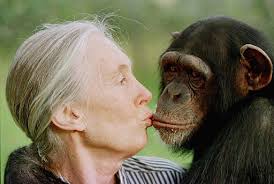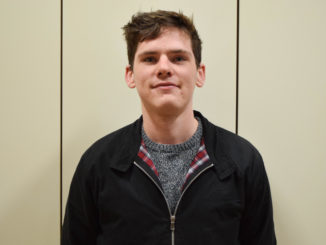
Many people go their entire lifetime without ever discovering their true vocation in life; but Jane Goodall did.
In 1960, young Jane Goodall, who had no scientific credentials or even a college degree, was chosen by anthropologist, Louis Leaky to go on an expedition in Africa to observe and record the behaviour of chimpanzees. Despite having no background knowledge in the field of primate behaviour she agreed to undertake the study proposed by Leaky mainly because she had a profound love for animals and she saw this as an opportunity to travel.
Goodall spent over two years trying to establish a non-threatening presence in a troupe of monkeys and eventually succeeded, by befriending an elderly chimp she affectionately named “David Greybeard”. Some of her observations included similarities between both humans and primates in their illustrations of intelligence, emotions and in their social relationships. However her most important behavioural discovery, observed and recorded during her time in the jungles of Tanzania, rattled the previously accepted wisdoms of physical anthropology. Her major discoveries were that chimps ate meat, though they were once thought to be strict herbivores, and that they both made and used tools. These discoveries narrowed the gap of intelligence between Humans and Primates.
From her discoveries Goodall has published numerous articles and several major books. She became known and respected in the scientific field and was one of only eight people to ever receive a PhD in Cambridge University without having first acquired an undergraduate degree. In 1977, Goodall established the Jane Goodall Institute which continues the research to this day that she began nearly 55 years ago in 1960.
Goodall became a staunch animal rights activist, travelling nearly 300 days a year, strongly advocating for the preservation of chimpanzees and their environment. She actively works with businesses and local governments to promote ecological responsibility and her efforts on behalf of captive chimpanzees have taken her around the world on a number of lecture tours. Goodall is also the former president of Advocates for Animals and has founded sanctuaries for chimps who were freed from captivity, many orphaned by the bush-meat trade.
She has received many tributes, honours, and awards from local governments, schools, institutions, and charities around the world In recognition of her achievements, the National Geographic Society Centennial Award in 1988 and more recently, she was named a Messenger of Peace by the United Nations in 2002.
More than fifty years ago Louis Leaky sent Goodall to study chimpanzees to see if their behaviour could provide an insight on human ancestry. Jane decided to ignore that idea and choose to study chimps for their own sake. From this she has created vast opportunities and institutions that have been of great significance in the field of science, as well as a selfless dedication and extraordinary personal example that has drawn many men and women into both science and conservation; and due to her awe inspiring life the name Jane Goodall will be forever synonymous with selflessness, endeavour and dedication.
Paul Dwyer



Leave a Reply